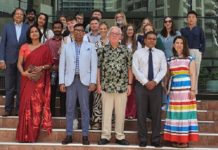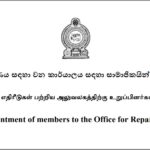Sri Lanka Tourism recently announced their plans to develop a ‘city tourism’ strategy to position Colombo as a tourism hub in South Asia. This initiative will follow some of the best practices of national tourist boards in Singapore, Thailand, Dubai, etc., in order to strategically implement forward thinking policies and uplift the family entertainment sector through the easing of taxation for luxury brands, development of locations, and provision of international entertainment venues and facilities.
The ‘City Tourism’ (‘Urban Tourism’) strategy will also focus on developing and enabling Colombo to host high quality international events that are globally proven to be a successful in City Marketing and Branding.
Commenting on the strategy, Minister of Tourism Prasanna Ranathunge stated, “Keeping in line with the vision of the government to make Colombo a Tourism Hub, we have taken some proactive steps to make this a reality. Last year, the budget announced some great tax benefits to encourage international luxury brands to make a presence in the Sri Lankan market. We have seen shopping as a key motivator for intra-regional travel and having brands that can pull international visitors is a key component in our strategy. Whilst ensuring that we protect all our local brands, we identified a way to make those international brands more competitive than in other parts of Asia, and thereby provide a compelling reason for regional tourists to visit Colombo”.
Kimarli Fernando, Chairperson of Sri Lanka Tourism stated, “In most developed tourism destinations, ‘city based’ tourism plays a very critical role in attracting international visitors. While this trend of ‘high quality event promotion’ is very visible in Europe and America, it is also highly evident in advanced Asian tourism destinations such as Singapore, Thailand, Vietnam, Malaysia, etc. as well. With the addition of Port City making Colombo a business hub, it is imperative that we now develop Colombo as a City Tourism hub”.
The core benefits expected via the ‘City Tourism’ strategy includes: direct foreign exchange earnings from artists, events and indirect earnings through ancillary services; increased traffic from the MICE tourism segment; boost in the employment and creative sector; addressing issues of seasonality and visitor dispersal; and the possibilities of promoting Sri Lanka as a 365-day travel destination.
Concluding, the Chairperson noted, “At present less than 35% of the tourists arriving to Sri Lanka visit Colombo. However, we have the highest room inventory and the largest investments are taking place in Colombo. We have also seen the trend of increased visitors from India and the region in the last few years. This will make Colombo an ideal tourism hub for shopping, family entertainment, great food and beverage experiences along with MICE tourism, once the world is conducive for travel post the effects of COVID-19. This strategy is expected to welcome an additional 2 million tourists within the next five [05] years, enabling us to reach the targeted USD 7.5 billion earnings from tourism at the end of the five [05] year global tourism promotional campaign period”.
At present Colombo has a 4,000 five-star room inventory, while the completion of Port City is expected to make a further contribution to the five-star room inventory, along with state-of-the-art convention and entertainment facilities. Furthermore, Colombo is also expected to have 1.5 million sq. ft. of leasable mall space by 2022. With a large proportion of much needed infrastructure, facilities and amenities in place throughout Colombo to cater to ‘City Tourism’, the development of a strategic approach to capture and enhance this offering for a global market is considered to be the logical next phase.
Under prevailing conditions, whilst global family entertainment has experienced a decline, according to market trends this segment is on its way to recovery and is likely to result in them opting for more entertainment experiences than ever before. With fewer options in the Asian region, Colombo is expected to soon be able to fill this market gap, as the preferred ‘City Tourism’ destination in Asia.












